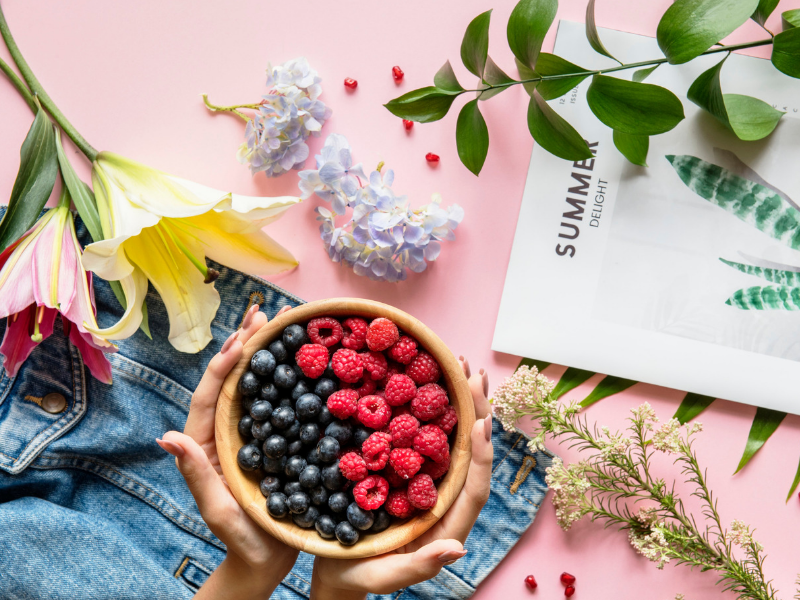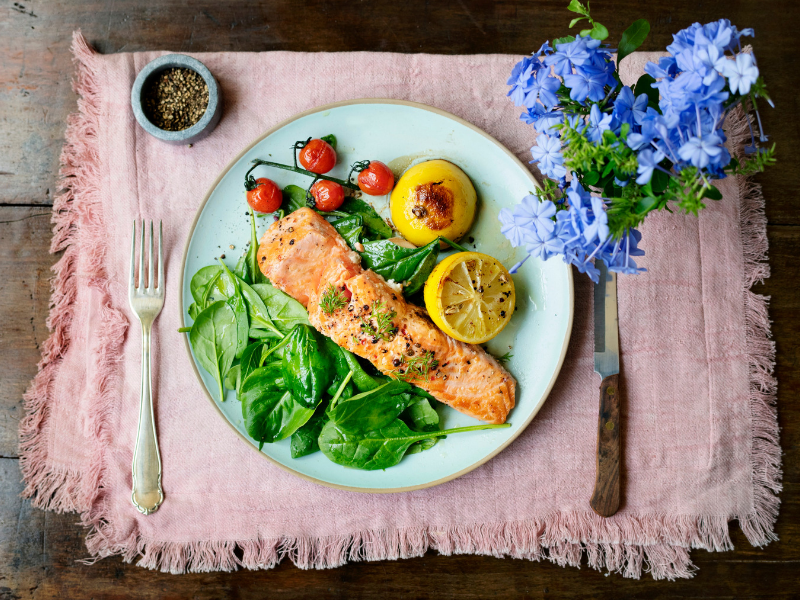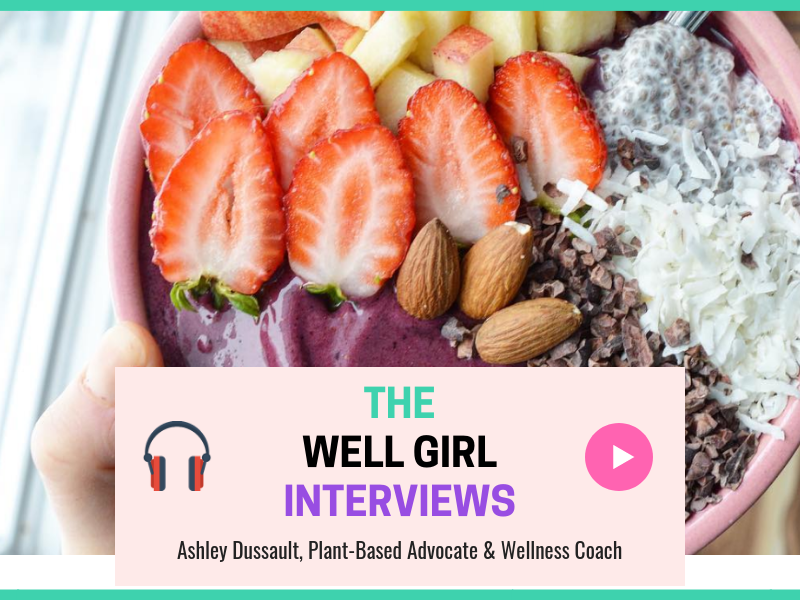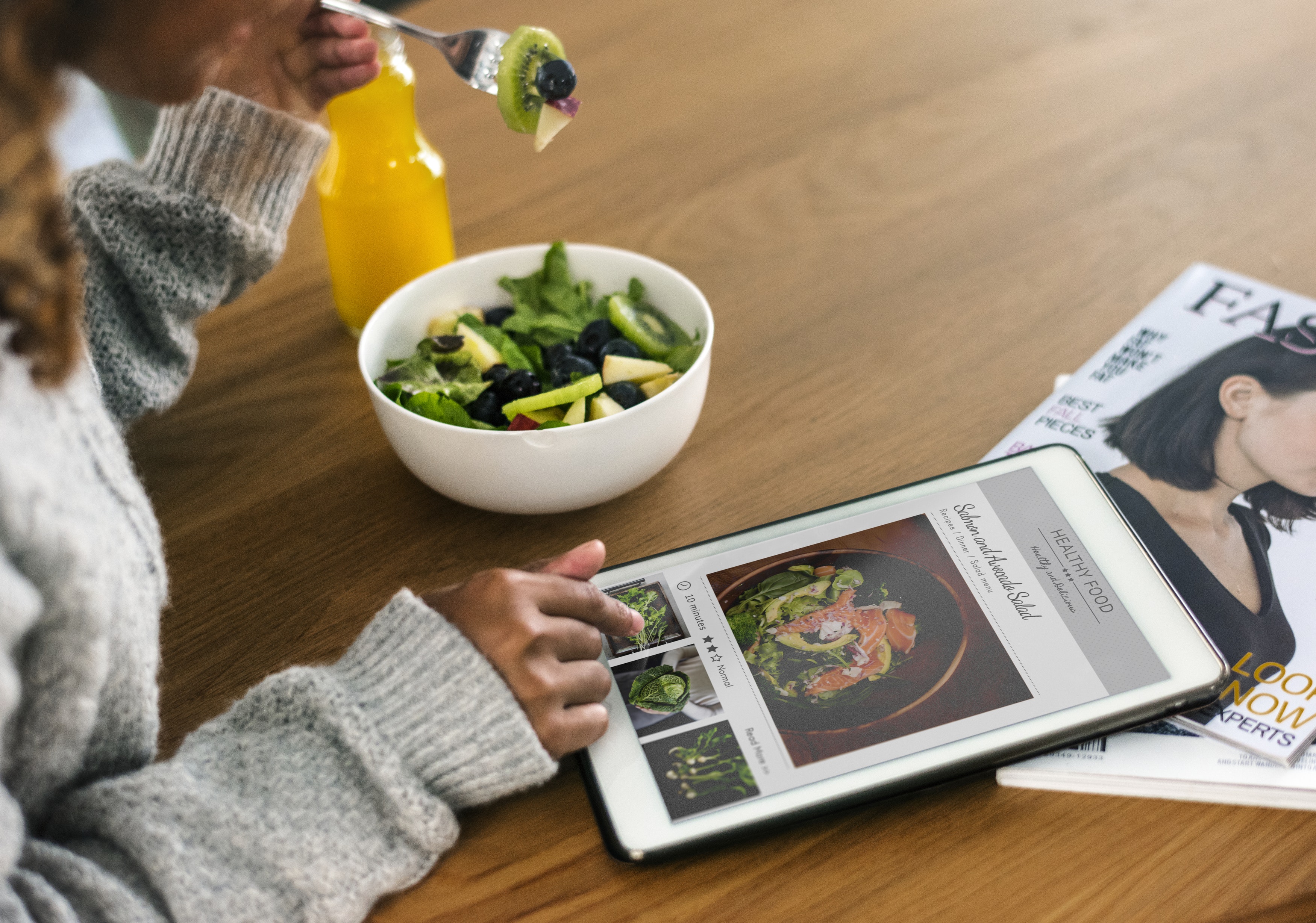Vegetarians (those who practice vegetarianism) have a diet that mainly consists of fruits, vegetables, legumes, and grains. All vegetarians have different reasons for becoming so but; the benefits between them, are one and the same.
So let me tell you what this guide isn’t going to be.
It’s not going to be some sugar-coated and watered down, perfectly curated fairy tale about why going vegetarian will make you a more ethical being. Although it definitely could, it’s just not that simple. Vegetarianism is a widely accepted way of life, all around the globe with roots in religion, animal rights, and environmental rights. And some of us just don’t want to eat meat anymore as a means to a healthier lifestyle and diet.
No matter what the reason may be, more and more of us are getting curious about the benefits and risks (there aren’t any) of going vegetarian. Including myself! Currently nine months in and I only think about prime rib two times a week.
But before we can even begin to tackle the nitty-gritties on how to go vegetarian, we need to understand all that it is to be vegetarian; aside from the obvious non-consumption of meat.
Table of Contents
Vegetarianism 101
A brief glance at history…
As it turns out, vegetarianism itself actually dates back to a time way before recorded history. The earliest humans’ diet consisted primarily of nuts, leaves, and berries for their nutrition and it wasn’t until the mid-1800s that the term “vegetarian” came to pasture.
Prior to “vegetarian” being coined, those who ate a meatless diet were called Pythagoreans. The term was derived from the Greek mathematician Pythagoras, creator of the geometric Pythagorean theorem. Pythagoras himself did not consume animal flesh and his followers carried out this dietary practice in his wake; as they believed it would promise them youth and longevity. Much similar to the claims made today about the wonders of vegetarianism.
Fast forward to 1850s-early 1900s, vegetarianism has gathered traction and influential momentum in society and politics with laws, societal groups, and written publications. Of the most popular? The Jungle by Upton Sinclair published in 1906. The Jungle was a pamphlet that exposed the terribly unsanitary conditions in the meat packing industry at that time and this weaned many people off of animal meat.
The outrage in response to the pamphlet’s release prompted the passing of the Pure Food and Drug Act and the creation of the U.S. Food and Drug Administration. It wasn’t until the 1970s that vegetarianism became popular in the US with the hippie movement, and the release of more compelling, thought-provoking bestsellers on the topic.
Who knew a bunch of kale-eaters could cause such a dramatic social and political reform?
Sooo… does this mean I can’t eat like any meat?
Well, yes and no. There are a few different types of vegetarians so it actually depends on which one you decide to be.
These are the most common types:
- Lacto-ovo vegetarian: eats dairy products and eggs; the most common type of vegetarian
- Lacto-vegetarian: eats dairy products, but not eggs
- Ovo-vegetarian: eats eggs, but no dairy products
- Pescatarian: eats eggs, dairy, and fish; technically this one isn’t really considered vegetarian as one would consume a dead animal, but I’ll toss it in as food for thought.
Whatever your goals and reasoning may be for giving up meat, you can always use each type as a stage to progress to the next.
It’s never too late to start eating well. A good diet can reverse many conditions. In short, change the way you eat and you can transform your health for the better.
T. Colin Campbell
Why Go Vegetarian?
So what’s the big hub bub? Why am I even making the effort to tell you all this? Well to start, we can see the huge impact that vegetarianism had on the people of the 19th century, but lets examine on a statistical level why a plant-based diet is becoming the diet of choice. And before you ask, no it’s not for the environment; although the environment is pretty cool.
Little disclaimer, I’m about to get really technical and scienticfical (totally not a word) here. Like I said before, learning how to go vegetarian is not just a change of diet or eating more veggies. It’s pivotal that you properly prepare and educate yourself before making any big lifestyle changes! That’s how you ensure success 🙂
Reduces the risks of developing cancer
There’s a groundbreaking study turned book that is hailed as the “bible for vegetarians”. It was conducted by the Professor Emeritus of Nutritional Biochemistry, T. Colin Campbell, from Cornell University back in the 1970s.
The point of the study was to prove or disprove that animal protein consumption is linked to an increased risk of cancer. This study is known as The China Study.
Campbell concluded from this 20-year-long study that people are at a reduced risk of developing cancers and diseases when they adhere themselves to a plant-based diet. In the study, they exposed rats to alfatoxin, a carcinogenic (cancer-causing) substance.
Prior to the exposure, the rats were separated into groups and fed different diets. One was fed a plant-based diet, while the other aflatoxin, plu a carnivorous diet and the results were indisputable. The rats with animal protein diets developed a staggering nine times as many tumors as the rats with a plant protein diet.
These results from The China Study stirred the world of nutrition and begged the question of why we have been told that meat is such a vital part of our daily nutrition. The American Institute of Cancer Research (AICR) has also expressed their opinions in regards to Campbell’s research:
This kind of radical diet change, done carefully and well, will certainly improve overall health. Keep in mind that these diet changes not only eliminated meat..but also eliminated fast food, highly processed foods,
AICRand sugar-laden drinks. In many cases, these changes led to a healthier weight. And a healthy weight = lower cancer risk.
I mean, you just can’t argue with facts.
The Well-Girl Interviews
Here we speak with a plant-based advocate and wellness coach on adopting whole foods…
Reduces inflammation in the body
It’s been proven countless times that the consumption of meat products is linked to an increased level of inflammation in the body. To make sense of how the two are linked together, we have to understand what inflammation is and how it works.
Inflammation occurs when the body senses invaders, or foreign microbes. As a result, an immune or allergic response is triggered to combat the intruders. But what does this have to do with meat products? Just about everything. Notorious for his work in nutrition, Dr. Michael Gregor, M. D. explains this very notion with his Exogenous Endotoxin Theory.
According to Gregor, scientists have discovered that a high amount of bacterial toxins known as endotoxins are present in the bloodstream after consumption of animal products.
This sudden onset of toxins in the blood is what triggers an immune response! Granted, there was some speculation as to where the endotoxins were coming from, but it was later determined that animal foods were the culprit.
Inflammation is the root cause of many chronic diseases that many of us suffer from. Including:
- Asthma
- Bronchitis
- Arthritis and more
When you eat a plant based diet, the concentration of endotoxins in the blood are much lower, so inflammation subsides relieving the symptoms of the disease. We can see how this plays out in Dr. Olov Lindahl’s study on the use of a plant-based diet to treat bronchial asthma.
“Those who follow vegetarian diets have lower blood pressure on average than omnivores.”Harvard Health Publishing
Reduces risk of heart disease, diabetes, and the hardening of arteries
The highest concentrations of saturated fats, the main cause of heart disease, are found in animal products. Naturally, if we consume less of these food items, then levels of the artery-clogging saturated fats and cholesterol will be much lower in the bloodstream. An abundance of the two lipids can add to the blood’s viscosity (thickness), leading to higher blood pressure, stroke, and atherosclerosis (narrowing and hardening of arteries).
But don’t start freaking about that last hamburger you ate. Knowing how to go vegetarian, means learning where you can improve your current eating habits for the better. The human body is super resilient and even damage from the toughest of diseases can still be reversed.
On average, people who consumed a plant-based diet had lower blood pressures than people who consumed an omnivorous diet (eats meat, eggs, and dairy). In fact, you can see a change in your blood pressure after switching to vegetarianism in just two weeks! That could be potentially life- saving!
Combined with a steady exercise regime, a plant-based diet that avoids processed foods and refined sugars can easily help control, and possibly eliminate type II diabetes.
A diet that is low-fat, and high in fiber/complex carbohydrates (the vegetarian diet), will allow insulin to work better to regulate glucose levels. A higher gluten tolerance has also been reported with a vegetarian diet, along with an overall lower body fat percentage than our meat-eating peers.
Common Myths About Vegetarianism
So I’m pretty sure you’ve only heard about a million and one different things about how to go vegetarian, it’s bad for you, nutritional deficiencies, yadda yadda, blah, blah.. Well, here I’ll be debunking the most popular loads of crap that most people will tell you when you’ve decided to make your dietary change.
“You’re not getting enough protein.”
**rubs temples in vegetarian**
You’re going to hear this one quite a bit. Probably every day for the first like, nah, probably for the remainder of your vegetarian journey. There is an extremely common (and extremely wrong) misconception that a vegetarian diet is dangerous because it lacks in animal proteins; which are considered to be more “complete” than plant proteins.
A complete protein is one that contains all 9 essential amino acids that aren’t produced naturally in our bodies; an incomplete protein does not. However, it’s been proven that animal flesh is not a complete protein because when these animals are alive, they too need to gather the essential amino acids from outside nourishment, just like humans do. They are not self-sufficient.
This protein combining myth stemmed from the rise of vegetarianism in the US around the 1970s. It was believed that one had to eat “complementary” proteins together (i.e. rice and beans) in order to meet the daily requirement. This again has also been disproved by studies that showed plants to have a complete amino acid composition.
And just to put things into perspective, most Americans, vegetarian or not, are actually eating over three times the recommended daily amount of protein and less than half of the amount of fiber. That’s where the real concern for non-vegetarians should be, not protein.
“It turns out our body is not stupid, it maintains pools of free amino acids that can be used to do all the complementing for us. Not to mention the massive protein recycling program our body has…protein is dumped into the digestive tract every day from our own body to get broken back down and reassembled, so our body can mix and match amino acids to whatever proportions we need, whatever we eat.”
Dr. Michael D. Gregor on the protein combining myth
“It must be so easy to stay fit and skinny.”
Oh if only this were true! Unfortunately with more Americans wanting to know how to go vegetarian and become veggie eaters, food companies are creating highly processed foods stuffed with refined sugars and fats to cater to the demand. And if you’re not eating processed foods, eating nothing but pizza, cheese puffs, cookies, and chips is just as deadly. Vegetarian doesn’t always equal healthy!
A vegetarian diet is very beneficial when it’s used to implement more fruit, veggies, and grains into your meals, but it can also be just as counter -productive.
Opt to always read the food labels if you do decide to eat these processed foods (highly recommend you don’t). Always be aware of what you’re eating. If you can’t pronounce what’s in the ingredients, it’s best to stay away from it.
“It’s not safe for children, pregnant women, or athletes.”
People state this claim as if children, pregnant women, and athletes are a completely different species than that of humans. The only difference between them and the average adult is their energy intake and expenditure. Their bodies don’t require any additional nutrients that differ from what the rest of us require.
Generally speaking, these three categories of people have a much higher level of energy expenditure and intake. So how does one accommodate? Simply up the amount of nutrients consumed to nutritionally support the high amount of energy that is used. Careful meal planning for children and athletes will ensure that they’re getting all the nutrients they need to be nutritionally sound.
Pregnant women in particular actually have a lot to gain from a vegetarian diet including, producing more pure breast milk. A vegetarian diet is naturally high in iron and folic acid which are vital nutrients for a soon-to-be-mother. A study showed that mothers who ate a plant-based diet, had less environmental contaminants present in their breast milk than mothers who eat animal products. That’s just alarming.
“Vegetarian diets are expensive and boring.”
This is probably the most offensive myth out of all of them. I’ll address the more pressing matter first, the cost. Meat is WAY more expensive than non-animal foods (I’m talking $4-$5 per pound for ground beef vs. $1 per pound of black beans) and the reason actually makes a lot of sense. Watch this video of super cheap ($3.50 per meal) vegetarian meal prep. The yield is huge for how little you spend.
Looking for more meal prepping guidance?
We also have an in-depth guide to help you get started…
Think about why you have to pay so much for a designer bag from overseas. What exactly are you paying for? I can tell you it’s not just the good quality material. It’s all the work that goes into making the purse; the import/export of goods, the physical assembly of the purse, etc.
It’s the same principle for meats. Producing meats for purchase is a VERY expensive business. From raising and caring for the animals, to breeding and slaughtering them; all of these costs add up and it leaves us to pay for that labor.
I can tell you from personal experience that since I’ve gone vegetarian, I save at least $40-$50 a month by skipping the butcher’s department. That’s about $600 a year. Depending on how much meat you typically buy, you could potentially save more.
And as far as vegetarians being boring, first of all, ouch! And second of all, being vegetarian is what rekindled my love for getting in the kitchen. Without the sought after taste of meat to aid the flavor of your recipes, you really have to get creative with spices and play with new foods. Learn from other cultures whose diets are primarily vegetarian. THIS IS LITERALLY THE BEST PART!
Philosophy of The Switch
We’ve established why you should go vegetarian and dispelled some myths that have been adhered to the diet. Now you’re strapped with knowledge, so let’s get into how to go vegetarian and my best tips to help you succeed and stick with it.
Things to Know and Remember
Why do you really want to go vegetarian?
This is really important to remember all throughout your vegetarian journey. As I’ve said earlier, everyone chooses to learn how to go vegetarian for different reasons so what’s yours? Maybe for a healthier life, or maybe you just want more veggies in your meals.
Whatever the reason may be, make it good and be sure it applies to you and not someone else’s dream to save the planet from meat-eaters. And don’t get me wrong, there’s nothing wrong with that but; it just isn’t realistic for everyone. Think back to what drives you every time you feel yourself wanting to give up.
Prepare for the inquisition
Don’t you miss meat? Don’t you miss having flavor? Where’s the pizazz? *violent eye roll*
Just be ready for the non-stop questions and mildly unnecessary comments from those who don’t agree with your new lifestyle choice. More than anywhere else, you’ll be interrogated mainly by friends and close loved ones. You may even be dishonorably discharged from the family for such a change (only kinda joking).
It may be hard to get support from those around you especially if you’re surrounded by meat-eaters. But stay strong and remember this is for you, not them. Or do what I did and make them some bomb veggie sliders to shut ’em right up!
Equip your kitchen and be ready to get creative
Meat no longer being the centerpiece of your dishes means you gotta step your chef game up. I’m not saying you need to buy a whole Costco card and get all the kitchen appliances you can afford. But having certain appliances like a food processor and a blender, will make meal prep uber easy on you.
Buuuut the more cool kitchen gadgets you have, the more creative you can be. So it’s your call. You’re really going to love all the new foods and flavor profiles you will discover. I definitely did.
Plan ahead
I hate to break it to you, but you’ll always be that “difficult” plus one who has special requests. But if you just plan around that, it really won’t be a problem. For example, on holidays and vacations look for restaurants that serve vegetarian options ahead of time so you won’t be stuck eating a depressing side salad.
If you’re going to foreign language speaking country, try to learn how to say “vegetarian” or “I don’t eat meat” in that respective language to ask for the right foods. If you’re going to a potluck and don’t know what to expect, bring a lunch just in case!
I’m telling you, not planning ahead like this can be a huge de-motivator so definitely try to plan ahead to stay with it.
The Strategy
Add before you take away
So before you even start excommunicating meat from your life, I want to tell you about a tactic I used that worked WONDERS for me. During the weeks preceding my departure from meat, I added more fruits, vegetables, grains, and legumes (beans) to my diet before even thinking about taking the chicken out of my chicken cesar salad.
Why do this you ask? Because, the more food you see on your plate, the less likely you are to notice when things are taken off your plate, in this case, meat.
If you don’t know or can’t tell that your plate is missing something, you’re more likely to accept the meal as is.
Don’t go cold tofurky
The first few weeks of going vegetarian are definitely the hardest. Ugh, I can just remember all the imaginary In N Out burgers I ate during those first couple weeks.
But if you want to make this first inning go by relatively smooth, the best thing you can do is slowly wean yourself off the meat. You have to remember, you’ve been eating meat your whole life so it’s probably become the norm, and a staple in your household. So, it might feel like something’s missing. (unless you follow the previous tip!)
Start with a day out of week where you abstain from meat consumption. Once that feels normal, up that to two days a week, and so on. It always much, much easier to give up something we’ve grown accustomed to in moderation.
Avoid trigger foods
This is another tactic that really helped me understand how much our brains are connected to our stomachs. What do I mean by trigger foods? These are foods that trigger a neural response that makes you crave other foods. Example: when you think of peanut butter, what’s the next thing you think of? Jelly. And you think of tea, next comes cookies. Pizza? Wings. Burger? Fries. And so on.
The sections of the brain responsible for memory, pleasure, and reward become activated when we eat certain foods. We remember the satisfying feeling of gratification we had when we ate that food before, so we want that feeling again. Try eating legumes, dark leafy greens, nuts, seeds, and grains to combat those feelings.
Why I Stayed Vegetarian
Better physical and emotional health
Learning how to go vegetarian was one of the best things I could’ve done for myself. I suffer from a chronic disease known as Irritable Bowel Syndrome (IBS) and,TMI, my bowels become agitated when I eat certain foods. One of those foods for me was meat.
Hours after I would eat meat, I would always be in extreme pain. The abdominal cramps were crippling and I would call off from work, the whole nine, a total nightmare. I wasn’t sure at the time exactly what was causing my pain, so I played process of elimination to find that meat was the culprit. Once I removed it from my diet, the pain immediately went away the next day. I was absolutely relieved and my psyche boosted.
It just tastes better
Now I used to looove me some pork and a good juicy steak. But even when I was eating meat, I couldn’t eat it without drowning the meat with vegetables as meat is pretty blah all by itself. I realized it could also be because I used to be an awful cook but my opinion still stands.
I truly grew to love vegetarian cuisine especially Indian and Mediterranean food. The super flavor-packed dishes just blew me away and I couldn’t go back to just eating regular meat afterwards. Too boring, imo!
So much cheaper
Revisiting what I mentioned earlier in this guide, I saved a ton of money at the grocery store by not having to make a visit to the meat market or the deli. At least, $10-$15 I saved per grocery shopping trip. Buy all your produce fresh, not frozen or sitting in a pool full of concentrated sugar water.
Also I began growing most of my herbs (cilantro, basil, mint, chives, etc.) and that saves me another $10 - $15 at the store. The longer you stick with this, the easier it becomes.
Recipes to Get You Started
Here are some of my favorite recipes to help get the veggie juices flowing if your feeling unsure of where to begin. Click the links to be led to the yummy recipes. 🙂
Roasted Cauliflower and Brussel Sprouts
Vegetarian Gumbo
Sweet Potato and Black Bean Enchiladas
Spicy Banh Mi
Scalloped Potatoes with Coconut Milk and Basil
Whew! You made it til the end! I’m proud of you! Now you can go forth and begin your journey to vegetarianism and hopefully veganism! Whatever reason you have for learning how to go vegetarian, it will definitely pay off.






